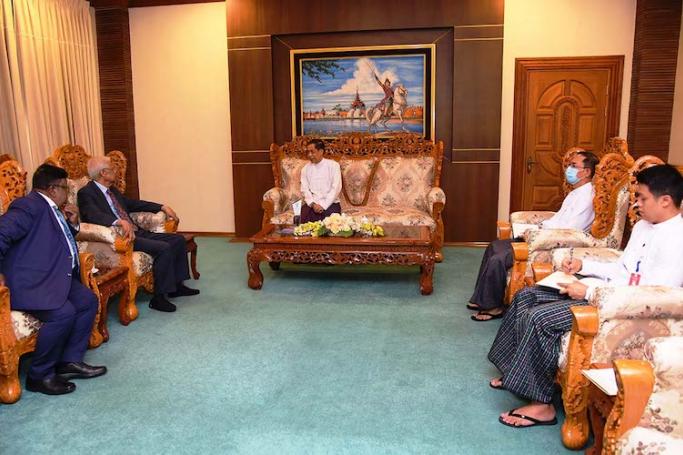A furor has blown up after Mr Shirumalla Venkat Narayan, President of the Foreign Correspondents Club of India visited Myanmar last week and met Ko Ko Hlaing Union Minister for International Cooperation of Myanmar in Naypyitaw, a visit publicized by the junta-run publication, the Global New Light of Myanmar.
A total of 10 foreign correspondents who are members of FCC India declared in a statement on Sunday that they had resigned from the FCC India in protest.
The statement was reportedly signed by Aletta André, Sebastien Berger, Sébastien Farcis, Sean Gleeson, Laura Höflinger, Peter Hornung, Oliver Mayer, John Reed, Lena Schipper and Gerry Shih. The 10 signatories in the letter include the bureau chiefs of the Economist, Washington Post, Agence France Presse, Financial Times, Radio France International and ARD.
The statement was also “supported” by 22 other former FCC members, who are currently based in India as foreign correspondents, according to local media.
Reed, one of the correspondents, said in a Tweet: “I'm horrified to see that the president of the @FCCNewDelhi, to which I belong, met with representatives of the military junta in #Myanmar, one of the world's worst places for journalists. I and other members will be asking the board to explain the visit.”
Thompson Chua, who claims to have resigned FCC India membership over this issue, wrote on his Twitter account that the visit “destroyed our faith in the FCC as an organisation that can successfully represent our interests. We resign our membership with immediate effect.”
He added, “There’s a big backlash against the @FCCNewDelhi president’s visit to #Myanmar, where he - at the invitation and cost of regime-run GNLM - met with the junta’s ministers to talk about economic and media cooperation”.
As veteran Indian journalist Subir Bhaumik, who worked for years for the BBC and Reuters told Mizzima, there is a serious question over the visit.
“Why should any free media kowtow to a brutal military junta like the one in Myanmar?” Bhaumik, who worked in Myanmar before 2021, told Mizzima.
“It is fine if media bodies went to Myanmar to investigate massive human rights violations of the regime but for the FCC office bearers to go on a junket organised by the junta is abominable and unacceptable. The junta will obviously use this visit to cultivate free media in the region and the visit has obviously been set up by Burmese diplomats in Delhi whose job is to project a crocodile as a dove of peace.”
This appears to be the case. The junta reportedly ran the visit in four stories with photos in the pages of the Global New Light of Myanmar. In an 8 June story, the paper said:
“U Kyaw Myo Htut, Deputy Minister for Foreign Affairs of the Republic of the Union of Myanmar, received the delegation led by Mr Shirumalla Venkat Narayan, President of New Delhi-based Foreign Correspondents’ Club of South Asia at the ministry in Nay Pyi Taw yesterday.
“At the call, they cordially exchanged views on the latest developments in Myanmar and matters pertaining to collaboration for the media sector development, dissemination of news on true situation of Myanmar to International community and capacity enhancement for state-owned media.”
In response to the FCC India members’ criticism, Narayan said in a statement to FCC India, reported by The Wire, that he did not visit Myanmar on behalf of FCC India.
Narayan said he was a professional journalist for over 50 years, travelled to 68 countries on work and interviewed scores of foreign dignitaries.
“My visit to Myanmar last week was one such, and I met many diplomats, journalists and ministers in Myanmar to understand what is going on there, when they plan to hold elections, etc., as any journalist would,” he said.
He also argued that no member of the board, whether travelling to Srinagar or Kabul, is bound to inform the managing committee (of FCC India), if they have gone on a private capacity. “And, being a member of the MC (managing committee) in no way restricts any of us from seeking stories, travel for exclusives and meeting all types of people.”
The furor, however, appears to go beyond the FCC India chief’s ill-advised junta-arranged visit to Myanmar to touch on longer-standing gripes concerning the club and the conditions under which foreign journalists work in India.
The protest statement also alleged that the latest episode was only part of a broader trend of ethical concerns besieging the club. “This episode, which continues a pattern of activities that betrays the club’s role in protecting and facilitating independent journalism, has irrevocably destroyed our faith in the FCC as an organisation that can successfully represent our interests. We resign our membership with immediate effect,” the statemen said, as reported by The Wire.
The Wire explained that there have been rising vocal concerns about the difficulties faced by foreign correspondents in doing their jobs in India, especially due to uncertainties in the timely renewal of their visa status as well other coercive methods. The pressures faced by the foreign correspondents had been documented in internal surveys conducted by the FCC India over the last three years.












